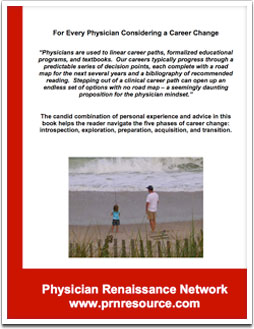Do You Feel Like You Wasted All That Training?
Questions from Doctors Considering a Career Change
By Michael J. McLaughlin, MD

The candid combination of personal experience and doctor-to-doctor advice in this book helps readers interested in non-clinical careers for physicians navigate the five phases of their physician career change: introspection, exploration, preparation, acquisition, and transition.
FROM THE INTRODUCTION:
I left my plastic surgery practice at the age of 36 to begin working in medical communications. If you are a physician reading this and are not familiar with the field of medical communications, there is no reason to worry; you are not alone. Until one year before my career transition, I had never heard of my current industry.
Now, as co-owner of Peloton Advantage, a medical communications company, I frequently interact with physicians in non-clinical jobs, as well as countless clinicians who are interested in career transition. Although I once considered myself an anomaly, I now have a better sense of the growing number of physicians in non-clinical jobs and the even larger number of opportunities available.
EXCERPTS FROM THE BOOK:
 “Physicians are used to linear career paths, formalized educational programs, and textbooks. Our careers typically progress through a predictable series of decision points, each complete with a road map for the next several years and a bibliography of recommended reading. Stepping out of a clinical career path can open up an endless set of options with no road map – a seemingly daunting proposition for the physician mindset.”
“Physicians are used to linear career paths, formalized educational programs, and textbooks. Our careers typically progress through a predictable series of decision points, each complete with a road map for the next several years and a bibliography of recommended reading. Stepping out of a clinical career path can open up an endless set of options with no road map – a seemingly daunting proposition for the physician mindset.”
“I felt stuck for so long, as though I had spent most of my life moving in the wrong direction. I was frustrated with myself. How could I become so trapped?”
“Leaving clinical practice was like finally breaking the surface and emerging into the sunlight after holding my breath under water for years.”
“My career transition was liberating. For the first time since starting medical school, I was extremely excited about my future career path. Interestingly, medical communications would draw upon my knowledge from the past. Leaving clinical practice would not mean that my past efforts in medicine would be thrown away. I was not going to be “wasting all those years of training.” The impact of this awareness is difficult to put into words. Perhaps more than anything, though, I was able to “come out of the closet” with regard to my desire to leave clinical practice. By speaking openly about my career, I could be myself again.”
Some of the 60 questions answered in the book:
- How did you decide what you wanted to do?
- What are my options outside of clinical practice?
- What medical specialties are in highest demand?
- What types of resources are available to explore non-clinical options?
- What job titles are the ones for physicians?
- How much money can a physician make in a non-clinical job?
- How did you network?
- What questions did you ask during a networking call?
- What skills transfer well to a non-clinical job?
- How can I “beef up” my resume?
- Should I get an MBA?
- Is geography and willingness to relocate an issue?
- What should I emphasize in an introductory letter?
- What should I emphasize in my resume/CV?
- What do you look for when interviewing an applicant?
- How did you know that you were making the right decision?
- How did your family react?
- How did your colleagues react?
- Did you have to take a pay cut?
- How did you know you were choosing the right job?
- In what ways do physicians struggle after transitioning?
- What have been the biggest surprises since your career transition?
- Looking back on the transition, what would you do differently now?
- What advice do you have for physicians considering a career transition?
- Do you feel like you wasted all that training?
Do You Feel Like You Wasted All That Training?



